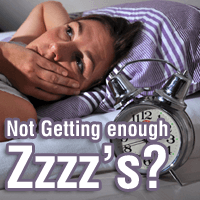
When you wake up in the morning, are you refreshed and ready to go, or groggy and grumpy? For many people, the second scenario is all too common.
 Numerous health conditions and medications can interfere with normal sleep – including prescription and over-the-counter medications used to treat sleep disorders. As we get older, it can become harder to fall asleep and stay asleep. But our need for sleep does not change. Just like diet and exercise, a good night’s sleep is essential for maintaining good health, keeping you alert and energetic, and building your body’s defenses against disease.
Numerous health conditions and medications can interfere with normal sleep – including prescription and over-the-counter medications used to treat sleep disorders. As we get older, it can become harder to fall asleep and stay asleep. But our need for sleep does not change. Just like diet and exercise, a good night’s sleep is essential for maintaining good health, keeping you alert and energetic, and building your body’s defenses against disease.
A growing number of studies have linked long-term sleep deficits with significant health problems.
1. Viral Infections
Anecdotal evidence supports the notion that when you’re tired and run-down, you’re more likely to get sick. A 2009 study in Archives of Internal Medicine offers some proof. Researchers tracked the sleep habits of 153 men and women for two weeks, then quarantined them for five days and exposed them to cold viruses. People who slept an average of less than seven hours per night were three times as likely to get sick as those who averaged at least eight hours.
2. Weight Gain
Not getting enough sleep makes you more likely to gain weight, according to a 2008 review article in the journal Obesity that analyzed findings from 36 different studies of sleep duration and body weight. The link appears to be especially strong among children.
Lack of sufficient sleep tends to disrupt hormones that control hunger and appetite, and the resulting daytime fatigue often discourages you from exercising. Excess weight, in turn, increases the risk of a number of health problems–including some of those listed in the following paragraphs.
3. Diabetes
A 2009 report in Diabetes Care found a sharp increase in the risk of type 2 diabetes in people with persistent insomnia. People who had insomnia for a year or longer and who slept less than five hours per night had a threefold higher risk of type 2 diabetes compared with those who had no sleep complaints and who slept six or more hours nightly.
As with overweight and obesity (which are also closely linked to type 2 diabetes), the underlying cause is thought to involve a disruption of the body’s normal hormonal regulation resulting from insufficient sleep.
4. High Blood Pressure
Researchers involved in the diabetes study also evaluated risk of high blood pressure among the same group of people, which included more than 1,700 randomly chosen men and women from rural Pennsylvania. As described in a 2009 article in the journal Sleep, the researchers found the risk of high blood pressure was three-and-a-half times greater among insomniacs who routinely slept less than six hours per night compared with normal sleepers who slept six or more hours nightly.
5. Heart Disease
A number of studies have linked short-term sleep deprivation with several well-known risk factors for heart disease, including higher cholesterol levels, higher triglyceride levels, and higher blood pressure.
One such report, published in a 2009 issue of Sleep, included more than 98,000 Japanese men and women ages 40 to 79 who were followed for just over 14 years. Compared with women who snoozed for seven hours, women who got no more than four hours of shut-eye were twice as likely to die from heart disease, the researchers found.
One common cause of poor sleep, sleep apnea, also raises heart disease risk. In the Wisconsin Sleep Cohort study, people with severe sleep apnea were three times more likely to die of heart disease during 18 years of follow-up than those without apnea. When researchers excluded those who used a breathing machine (a common apnea treatment), the risk jumped to more than five times higher. Apnea spells can trigger arrhythmias (irregular heartbeats), and the condition also increases the risk of stroke and heart failure.
6. Mental Illness
A study of about 1,000 adults ages 21 to 30 found that, compared with normal sleepers, those who reported a history of insomnia during an interview were four times as likely to develop major depression by the time of a second interview three years later. And two studies in young people–one involving 300 pairs of young twins, and another including about 1,000 teenagers–found that sleep problems developed before a diagnosis of major depression and (to a lesser extent) anxiety. Sleep problems in the teenagers preceded depression 69 percent of the time and anxiety disorders 27 percent of the time.
7. Mortality
In the Japanese heart disease study described above, short sleepers of both genders had a 1.3-fold increase in mortality compared with those who got sufficient sleep. Severe sleep apnea raises the risk of dying early by 46 percent, according to a 2009 study of 6,400 men and women whom researchers followed for an average of eight years.
Although only about 8 percent of the men in the study had severe apnea, those who did and who were between 40 and 70 years of age were twice as likely to die from any cause as healthy men in the same age group.
– Harvard Health Letters
Excerpted from Harvard Health Special Report, “Improving Sleep: A Guide to a Good Night’s Rest.”Prepared by the editors of Harvard Health Publications in consultation with Lawrence Epstein, M.D., Instructor in Medicine, Harvard Medical School; Division of Sleep Medicine, Brigham and Women’s Hospital; and Medical Director, Sleep Health Centers, Brighton, MA.
(C) 2012. PRESIDENT AND FELLOWS OF HARVARD COLLGE. ALL RIGHTS RESERVED DISTRIBUTED BY TRIBUNE MEDIA SERVICES, INC.

